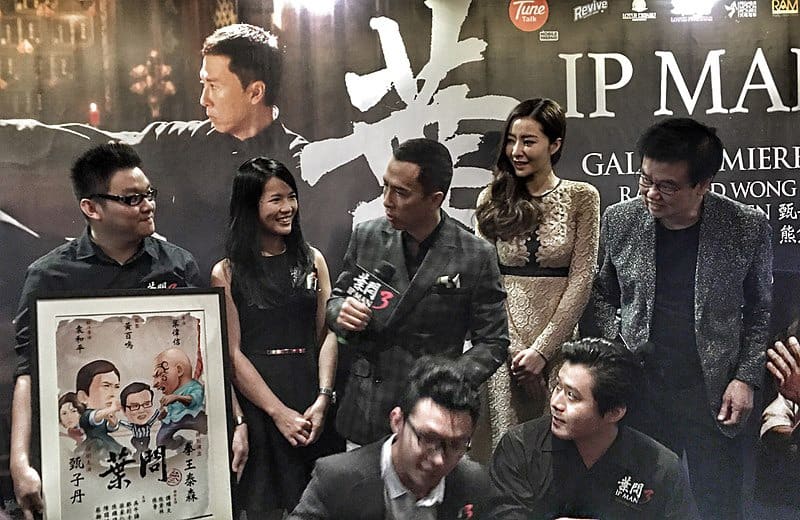Ip Man 4: The Finale, a film with secret symbolism

It is not heroism that is important. It’s who the hero is that matters.
On 20 December 2019, Ip Man 4: The Finale was released. Preceded by four other related martial arts films spanning over a decade, Ip Man 4 lived up to its well-established reputation. According to the Critics Consensus on Rotten Tomatoes, “The Finale serves as a satisfying rebound—and fitting finale—for the franchise.” With a 90 per cent on the Tomatometer and a 95 per cent Audience Score, Ip Man 4 clearly delivered a satisfying ending to the saga.
The film was so popular in China that according to IMDB, it “broke the 100 million RMB box office … on its first day of release, outgrossing the total for Star Wars: The Rise of Skywalker.” But what made this film so popular?
While the series is only loosely based on historical fact, the storyline and what Ip Man stands for is what makes this series so compelling. Even in the first Ip Man film, Master Ip defends the honour of his town by embarassing a brash outsider who would have endangered them. The film portrays Ip as a heroic figure, someone who could make modern Chinese people say, “that’s how our ancestors were.”
This theme of heroism prevails throughout every film of the series. But in these Ip Man stories, it is not heroism that is important. It is who the hero is that matters. And the hero in this franchise is a Chinese person using Chinese martial arts with Chinese ethics and a very Chinese attitude to life (if there ever was one). Ip essentially represents a recovering Chinese national identity.
Ip Man 4 begins with Ip being diagnosed with cancer. He is invited to visit his student Bruce Lee in San Francisco. While in America, Ip tries to secure schooling for his son Ip Ching and is faced with the harsh realities of Chinese people in America in the 1960s.
There is a scene where another kung fu master’s daughter, Yonah, is experiencing intense anti-Chinese racism after achieving some success in cheerleading. Jealous students ambush Yonah in a group and call her, “[a] little yellow monkey” and explain to her that, “in America, [Chinese] follow. They don’t lead.” Yonah tries to avoid the confrontation but when she feels forced to speak up she exclaims, “America has always had immigrants. The Indians are the only real Americans. Your ancestors stole their land. Pale face.” Fighting ensues and Ip Man eventually steps in, neutralizes the teens who are attacking him with a hockey stick, and brings Yonah home.
The movie’s theme strongly supports the notion that Chinese people should work together. On the bus home Yonah tells Master Ip, “The way the Chinese are treated here has always been unfair.” She also quotes her dad in saying, “‘Chinese people should help each other out.’”
A tip-of-the-hat goes out from the movie director in the scene that follows in the most interesting way. A lot leads up to this scene, but Yonah’s dad and Ip Man have a duel concerning a difference in opinion. The fight is cut short by a sudden earthquake that lasts perhaps even too long for what would typically seem necessary for the film. Chinese relics in the room are being smashed all around, almost as if symbolizing civil war or civil conflict within one culture. The next scene pans to a Chinese ancestry shrine to signify either spirits, death, or perhaps even as a moment of silent memorial. Immediately after, a sign to the doorway of the room reads, “All Chinese are one big family.”
This phrase stuck with me. I wondered, what is the significance that would make the director add this to the film. It could be self-evident, but why? Upon further investigation I found no sources for the quote anywhere on the Internet except an article from 2009.
That article, published by chinadaily.com.cn was about Aimai Yiminti, the person who said those words. In the article you quickly notice that Yiminti has ties to Hong Kong and is firmly a supporter of unity between Han and Uyghur Chinese. As a Uyghur himself, he emphasized, “I have many Han friends in Beijing and about 300 of them attended my birthday party this year.” This statement was issued just following the Shaoguan incident where two or more Uyghur migratory workers in Guangdong were brutally murdered on 25 June 2009. Riots exploded in their native province of Xinjiang and more than a hundred Han people were killed by rioters. It became a large incident, but upon hearing the news, Yiminti expressed that Han and Uyghar are both Chinese. He donated a large amount of money to the relief efforts of the incident, and upon further reading of the article, Yiminti had also sent, “1 million yuan to help victims of the quake in Sichuan province last May.” Yiminti was also known, “in his community for his stunt skills. He broke his own record by smashing a pile of 27 cobblestones in one minute with his palms.” Apparently he must have been quite the martial artist – a coincidence, to have his words referenced so prominently in the finale of this martial arts saga?









